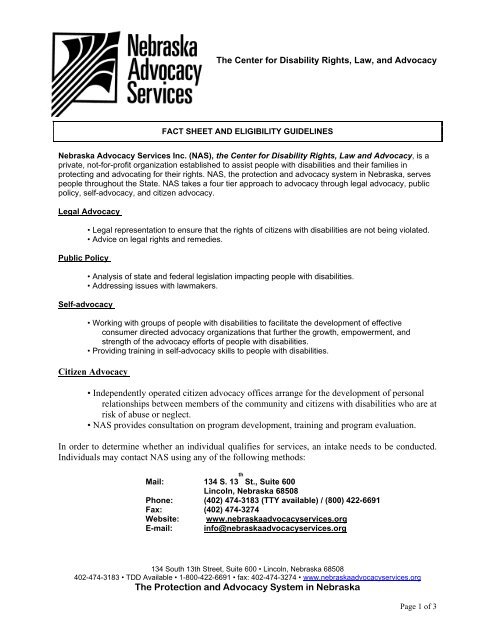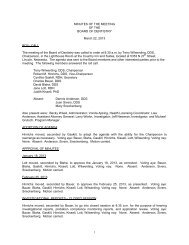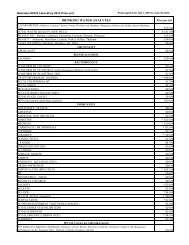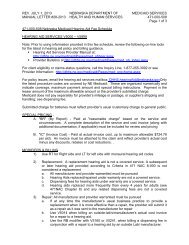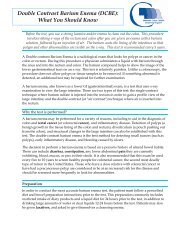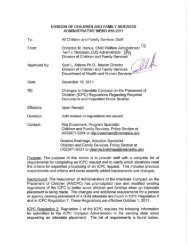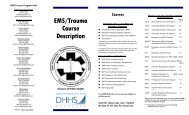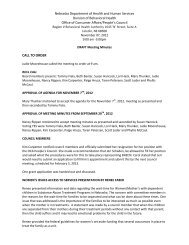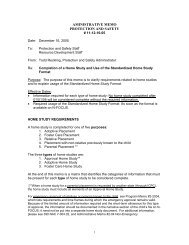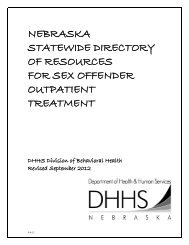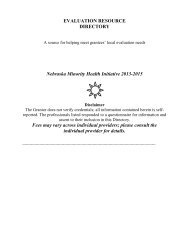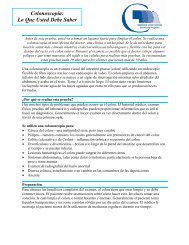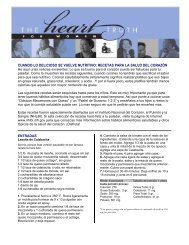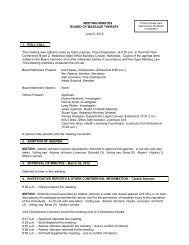Advocacy Services Fact Sheet - Nebraska Health and Human Services
Advocacy Services Fact Sheet - Nebraska Health and Human Services
Advocacy Services Fact Sheet - Nebraska Health and Human Services
Create successful ePaper yourself
Turn your PDF publications into a flip-book with our unique Google optimized e-Paper software.
The Center for Disability Rights, Law, <strong>and</strong> <strong>Advocacy</strong><br />
FACT SHEET AND ELIGIBILITY GUIDELINES<br />
<strong>Nebraska</strong> <strong>Advocacy</strong> <strong>Services</strong> Inc. (NAS), the Center for Disability Rights, Law <strong>and</strong> <strong>Advocacy</strong>, is a<br />
private, not-for-profit organization established to assist people with disabilities <strong>and</strong> their families in<br />
protecting <strong>and</strong> advocating for their rights. NAS, the protection <strong>and</strong> advocacy system in <strong>Nebraska</strong>, serves<br />
people throughout the State. NAS takes a four tier approach to advocacy through legal advocacy, public<br />
policy, self-advocacy, <strong>and</strong> citizen advocacy.<br />
Legal <strong>Advocacy</strong><br />
Public Policy<br />
Self-advocacy<br />
• Legal representation to ensure that the rights of citizens with disabilities are not being violated.<br />
• Advice on legal rights <strong>and</strong> remedies.<br />
• Analysis of state <strong>and</strong> federal legislation impacting people with disabilities.<br />
• Addressing issues with lawmakers.<br />
• Working with groups of people with disabilities to facilitate the development of effective<br />
consumer directed advocacy organizations that further the growth, empowerment, <strong>and</strong><br />
strength of the advocacy efforts of people with disabilities.<br />
• Providing training in self-advocacy skills to people with disabilities.<br />
Citizen <strong>Advocacy</strong><br />
• Independently operated citizen advocacy offices arrange for the development of personal<br />
relationships between members of the community <strong>and</strong> citizens with disabilities who are at<br />
risk of abuse or neglect.<br />
• NAS provides consultation on program development, training <strong>and</strong> program evaluation.<br />
In order to determine whether an individual qualifies for services, an intake needs to be conducted.<br />
Individuals may contact NAS using any of the following methods:<br />
Mail: 134 S. 13 th St., Suite 600<br />
Lincoln, <strong>Nebraska</strong> 68508<br />
Phone: (402) 474-3183 (TTY available) / (800) 422-6691<br />
Fax: (402) 474-3274<br />
Website: www.nebraskaadvocacyservices.org<br />
E-mail: info@nebraskaadvocacyservices.org<br />
134 South 13th Street, Suite 600 • Lincoln, <strong>Nebraska</strong> 68508<br />
402-474-3183 • TDD Available • 1-800-422-6691 • fax: 402-474-3274 • www.nebraskaadvocacyservices.org<br />
The Protection <strong>and</strong> <strong>Advocacy</strong> System in <strong>Nebraska</strong><br />
Page 1 of 3
The following objectives are used in conjunction with client eligibility requirements to determine the<br />
acceptance of cases for legal representation.<br />
Priority Area: Inclusion, Access <strong>and</strong> Transition to the Community<br />
• Represent at least ten (10) people with disabilities in acquiring assistive technology devices<br />
<strong>and</strong> services, including systemic litigation.<br />
• Represent at least ten (10) people with disabilities in employment cases.<br />
• Represent at least ten (10) people with disabilities in public accommodations cases.<br />
• Implement strategies to secure vocational, employment <strong>and</strong> other support services for<br />
beneficiaries of Social Security disability income programs through the federal Ticket to<br />
Work <strong>and</strong> Work Incentives Act for at least twenty-five (25) beneficiaries of Social<br />
Security programs.<br />
• Collaborate with other organizations to inform two hundred (200) people with disabilities<br />
about their voting rights <strong>and</strong> assist two (2) people with disabilities to file complaints<br />
with the Secretary of State.<br />
• Continue prosecution of the systemic litigation/class action entitled Bill M. on behalf of<br />
people with developmental disabilities to help them secure appropriate services.<br />
• Represent at least twenty (20) students with behavioral impairments, or students in special<br />
education who are at risk of/or who have been disciplined, suspended, or expelled in<br />
order to secure for them a free <strong>and</strong> appropriate education in the least restrictive setting.<br />
• Identify a systemic special education issue that would impact the most, <strong>and</strong> most diverse,<br />
population in <strong>Nebraska</strong>.<br />
Priority Area: Isolated <strong>and</strong> Vulnerable Adults<br />
• Investigate <strong>and</strong> respond to no fewer than one hundred fifty (150) allegations of practices,<br />
which cause or contribute to the serious harm or death of any individuals with a disability<br />
in <strong>Nebraska</strong>.<br />
• Continue prosecution of the systemic litigation/class action entitled Elizabeth M. on behalf<br />
of women who have been sexually <strong>and</strong> physically abused in the Regional Centers.<br />
• Maintain a regular presence at the Lincoln Regional Center twice a month, the Hastings<br />
residential rehabilitation facility twice a month <strong>and</strong> the Norfolk Regional Center twice a<br />
month.<br />
Eligibility Requirements<br />
PADD (Protection <strong>and</strong> <strong>Advocacy</strong> for Individuals with Developmental Disabilities): A<br />
developmental disability means that an individual must have a severe mental or physical impairment<br />
which occurs before the age of 22, is likely to be life-long, results in functional limitations in at least<br />
three areas of major life activity (self-care, receptive <strong>and</strong> expressive language, learning, mobility,<br />
self-direction, capacity for independent living <strong>and</strong> economic self-sufficiency), <strong>and</strong> needs an<br />
individually tailored plan for care, treatment or other services for an extended period of time.<br />
Page 2 of 3
PAIMI (Protection <strong>and</strong> <strong>Advocacy</strong> for Individuals with Mental Illness): Any person with a<br />
significant mental illness, as determined by a Licensed Mental <strong>Health</strong> Professional, who is currently<br />
an inpatient or resident of a facility providing care <strong>and</strong> treatment for mental illness, including persons<br />
who have been discharged from a facility within the last 90 days or who present an issue that arose<br />
during their stay at a facility or within 90 days after discharge or the person lives in the community.<br />
NAS can provide services to people who are confined in a jail for reasons other than serving a<br />
criminal sentence.<br />
PAIR (Protection <strong>and</strong> <strong>Advocacy</strong> for Individual Rights): Any person with a physical or mental<br />
disability that substantially limits one or more major life activities, or with a record of such<br />
impairment, or who is regarded by others as having such impairment <strong>and</strong> who is ineligible for<br />
assistance under the CAP (Client Assistance Program), PADD <strong>and</strong> PAIMI programs.<br />
PAAT (Protection <strong>and</strong> <strong>Advocacy</strong> for Assistive Technology): Any person denied assistive<br />
technology devices or services designed to meet the specific needs of an individual with disabilities.<br />
PABSS (Protection <strong>and</strong> <strong>Advocacy</strong> for Beneficiaries of Social Security): Any person with a<br />
disability receiving Social Security Income or Social Security Disability Insurance <strong>and</strong> the person has<br />
return to work issues.<br />
PAVA (Protection <strong>and</strong> <strong>Advocacy</strong> for Voting Access): NAS will use the PAVA funding to ensure<br />
individuals with disabilities participate in the electoral process, including registering to vote, casting<br />
a vote <strong>and</strong> accessing polling places.<br />
PATBI (Protection <strong>and</strong> <strong>Advocacy</strong> for Individuals with Traumatic Brain Injury): This program<br />
focuses on information, referral, advice, outreach, self-advocacy, family advocacy, <strong>and</strong> legislative<br />
advocacy to individuals with traumatic brain injury.<br />
CASE ACCEPTANCE CRITERIA WHICH APPLIES TO ALL NAS PROGRAMS<br />
NAS reserves the right to refuse to accept a case under the following circumstances:<br />
• The problem or issue does not arise from the individual’s disability.<br />
• An ethical or professional conflict exists within NAS.<br />
• The individual is currently represented by an attorney.<br />
• Legal action was started at the time the individual contacted NAS.<br />
• There is another agency “better equipped” to h<strong>and</strong>le the case.<br />
• The legal issues are clearly established <strong>and</strong> a system is established in which non-legal advocates<br />
can effectively pursue enforcement of rights.<br />
• No legal remedy is available.<br />
Regardless of the individual’s disability or their initial eligibility, NAS will not accept cases, but will<br />
only provide information <strong>and</strong> referral services, when the following issues are presented:<br />
• divorce, child custody, <strong>and</strong> adoption;<br />
• estate planning (wills <strong>and</strong> trusts);<br />
• criminal defense;<br />
• mental health board commitment;<br />
• l<strong>and</strong>lord-tenant;<br />
• tax law, corporate or business law, consumer law, debtor-creditor law;<br />
• personal injury (other than injuries arising from abuse <strong>and</strong> neglect);<br />
• initiation of guardianship or conservatorship of a person; <strong>and</strong><br />
• cases involving inmates at the state correctional facility.<br />
Page 3 of 3


